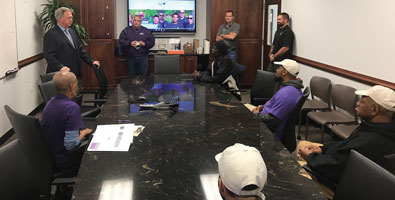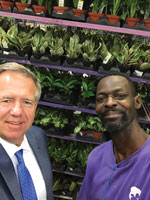10/1/2017
Positive Disruption
Gary Mangum
I’ve shared thoughts about tough weather impacts too often in this column. In tallying subjects, I’ve also overused the words “change is good.” And unless we’re talking about bees, almost every column has included something about people resources. People, or as some refer to as labor, are the reason we all either succeed or eventually fail.
In our own business, we’ve utilized the “Act Like You Own It” mantra since the time my parents first started Bell Nursery. This thinking has helped us work in the marketplace in a positive way before my partner and I got involved with Bell, and for nearly 25 years has served us well, as we closely aligned with the needs of our most important and only customer—the Home Depot.
 Pictured: Orientation day with the first participants from Project SERVE. Left to right: Mavis Benton, Gary Mangum, Andy Moore—Director of Training, John Huffington—Living Classrooms Workforce Development Director, David Ryder—VP HR and Bell Nursery’s first four employees from Project SERVE.
Pictured: Orientation day with the first participants from Project SERVE. Left to right: Mavis Benton, Gary Mangum, Andy Moore—Director of Training, John Huffington—Living Classrooms Workforce Development Director, David Ryder—VP HR and Bell Nursery’s first four employees from Project SERVE.
Over these years, my own thinking has evolved and it gets challenged in some way with great frequency. From the earliest days where my partner and I resisted a constant stream of family and other advice related to customer diversity—to select years with just one customer where our thinking was appropriately challenged. Today, recounting physical involvement and countless funny stories along the way, I couldn’t write a better story about the importance of a trusted and proven business relationship.
For the backbone of our business, our associates, employees, personnel and staff—our “labor”—we’re blessed to cut across virtually all races, religions and likely every demographic there is in this multi-faceted business world. Starting in and serving the mid-Atlantic region for so long, we’ve learned firsthand many important lessons involving diversity in the workplace. It’s always been encouraged at Bell—not because it’s the law, but because it’s a direct reflection of the markets we serve and people we know. But like many in our industry, we’re contemplating future production and distribution labor
availability.
As part of our community outreach, I’ve found myself in prison this past year—as I’m the one at Bell with the most free time. In our local criminal justice system, I’ve learned more about Baltimore’s problems and more particularly, Baltimore’s “returning citizens”—a significant number of people who, due to criminal records, find it difficult to become gainfully employed.
Through exposure from the Governor’s Office of Community Initiatives, we met the CEO and first employee of the Living Classrooms Foundation—now successful in our region for many years. With long-term Bell needs in mind, we were introduced to the leadership of the Workforce Development Team’s Project SERVE (Service-Empowerment-Revitalization-Volunteerism-Employment Training). The people we’ve met through this organization have a meaningful desire to disrupt the cycle of poverty in Baltimore—and surely the model could/must work in other urban environments where populations struggle across generations. In our case, Project SERVE and their long-term preparatory training is creating a motivated workforce. As we prepare to add more individuals to our behind-the-scenes team that shares the desire to excel, our existing employees are able to share in the positive feelings.
 Pictured: Fun moment on Bell’s loading dock with Gary and Greg (right)—originally from Project SERVE, now a proud full-time, year-round employee at Bell.
Pictured: Fun moment on Bell’s loading dock with Gary and Greg (right)—originally from Project SERVE, now a proud full-time, year-round employee at Bell.
Working together and watching our own results, I’ve modified my own long-term thinking and acknowledge that successful reintegration is a safer and much more productive place to be than the alternative coming out of the criminal justice system. Most entrepreneurs enjoy giving back to our communities somehow, so I would challenge our peers to be willing to look into this potential group of future employees.
As our country’s immigration posture changes over time, and at least some of agriculture’s long-time predictable work force changes, this is an area that could be tested by more of us. To be clear, our own work in this area takes place in some of our most closely supervised areas of the business—our production greenhouses, and shipping and receiving areas. Our efforts to date remain small scale. We’re not working together in retail environments, though the people we’re getting to know would likely be able to handle most anything, as their situational training and work ethic has been very impressive to observe.
One thing we quickly observed is the difference between the cultures of our longer-term employees and the new returning citizens have not created anticipated barriers. Instead, friendships in and outside of work appear to be developing, and there has definitely been more warmth and empathy demonstrated than we anticipated. The outside professionals involved have attributed much of this to the onboarding process, where our most senior leaders participated in not only making our new hires feel welcome, but each became invested in their success.
Most people I speak with at industry conferences and elsewhere talk about labor as a challenge. I hope that small efforts like our work with Project SERVE can blossom into meaningful changes for our own business—but most especially, for the communities that need some positive disruption.
GT
Gary Mangum is co-owner of Bell Nursery, Burtonsville, Maryland, and can be reached by email at gary@bellnursery.com.